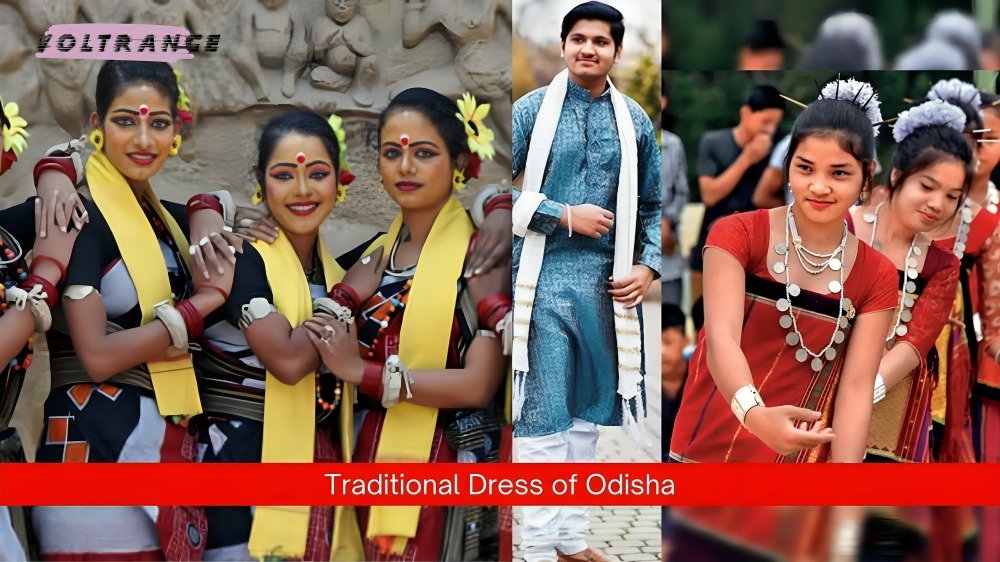
Traditional Dress of Odisha
Odisha, often referred to as the land of temples, is renowned for its iconic Jagannath and Konark temples. This Indian state holds a significant place in the country’s cultural and historical landscape, known for its exquisite sculptures, ancient monuments, classical dance forms, and music. In ancient times, Odisha was known by various names such as Utkala, Tosala, Odra, Kosala, and Kalinga. Just like its rich heritage, the traditional clothing of Odisha is equally fascinating and unique, reflecting the vibrant culture and lifestyle of its people. Let’s take a look at some of the traditional attire of Odisha, which remains deeply rooted in the state’s cultural identity.
Traditional Dress of Odisha for Women
The women of Odisha are often seen draped in beautiful sarees, which aren’t just any ordinary garments but hold a special significance. Some of the most popular sarees include Khandua, Sambalpuri Ikat, Sonepuri, Pasapali, Berhampur, and Kataki sarees.
1. Khandua Saree
The Khandua saree is known for its unique metallic accents and beautifully curvy edges, symbolizing courage and boldness. Made from Malda silk, these sarees are intricately designed and are typically worn on special occasions like weddings and festivals. The body of the saree often features simple ikat work, while the pallav or end piece showcases more elaborate designs in vibrant colors such as orange, red, and yellow. The borders are typically woven in deep shades like crimson, blue, and black, adding a striking contrast to the overall look.
2. Sambalpuri Ikat
Another popular saree from Odisha is the Sambalpuri Ikat, crafted using a unique tie-dye technique known as Bandhkala. These sarees often feature nature-inspired designs such as rudraksha and chakra motifs. The process of weaving these sarees is time-consuming and requires great precision, making them one of the more expensive options. Their timeless appeal and intricate craftsmanship make them a favorite among saree lovers.
3. Sonepuri Saree
Also known as Bomkai, the Sonepuri saree is a blend of soft silk with intricate embroidery, particularly on the borders and pallav. Inspired by tribal art, these sarees feature nature-based motifs and are available in colors like blue, orange, red, yellow, and black. The pallav is usually woven with bold patterns, while the saree’s body boasts smaller, more delicate ikat designs.
4. Pasapali Saree
Originating from Bargarh, the Pasapali saree is renowned for its striking double ikat weaving technique, creating a chessboard-like pattern. This saree is highly distinctive, with bold color combinations and intricate patterns along the borders, making it a visually captivating piece.
5. Berhampur Saree
The Berhampur Patta silk saree is a classic symbol of Odisha’s cultural heritage. Originating from the silk city of Berhampur, these sarees are known for their temple-like patterns along the borders. They are traditionally worn during wedding ceremonies and are considered a mark of pride for the state.
Aside from sarees, women in Odisha also adorn kurtas paired with uttariyo or dupattas. The uttariyo is a larger piece of cloth, often embellished with zari work, used to cover the head, especially for brides.
Traditional Dress of Odisha for Men
1. Sambalpuri Kurtas
Men in Odisha often wear Sambalpuri kurtas, which come in a variety of colors and fabrics. These kurtas are known for their comfortable fit, featuring minimalistic designs and small square patterns that reflect the state’s rich textile heritage.
2. Kurta with Dhoti or Pyjamas
In rural areas, men frequently pair cotton kurtas with dhotis, which are traditionally draped around the waist. Odisha’s dhotis stand out due to their unique brick-colored borders. For formal or religious occasions, men may also wear plain white pyjamas, completing the traditional attire.
3. Sherwani
For weddings and other festive occasions, men opt for Sherwanis, which are intricately designed with velvet fabric and often embedded with precious stones. The sherwani is paired with a turban and pyjama, giving the groom a royal look.
Traditional Tribal Dress in Odisha
Odisha’s tribal communities have their own distinct clothing, which varies depending on their social roles, such as priests, clan chiefs, or revenue collectors. For example, the Bondos wear garments like “rings,” while the Dangarias wear embroidered shawls that are symbolic in their culture. These tribal outfits are not only significant in terms of aesthetics but also hold cultural and social importance within the communities.
Odisha Traditional Dance Attire
The traditional attire for the Odissi dance is an elaborate costume that reflects the grandeur of Odisha’s culture. This classical dance form requires dancers to wear specially designed sarees adorned with silver jewelry, including anklets, chokers, and belts. The intricate ornamentation, combined with the flowing saree, adds to the visual appeal of the dance, representing the state’s artistic richness.
Conclusion
Odisha’s traditional clothing is a testament to its rich cultural heritage, deeply connected to its history and artistry. Despite the shifts in modern fashion, the people of Odisha continue to proudly wear their traditional attire during festivals, weddings, and cultural celebrations. These beautiful garments, especially the handwoven sarees, are not only a symbol of craftsmanship but also a reflection of the state’s enduring cultural legacy.





More Stories
Is Sansui an Indian Company? True Or Not
Handles Salary Revision and Appraisal: 10 Fact
Is Walmart an Indian Company? True Or Not